posted by Dave Arnold
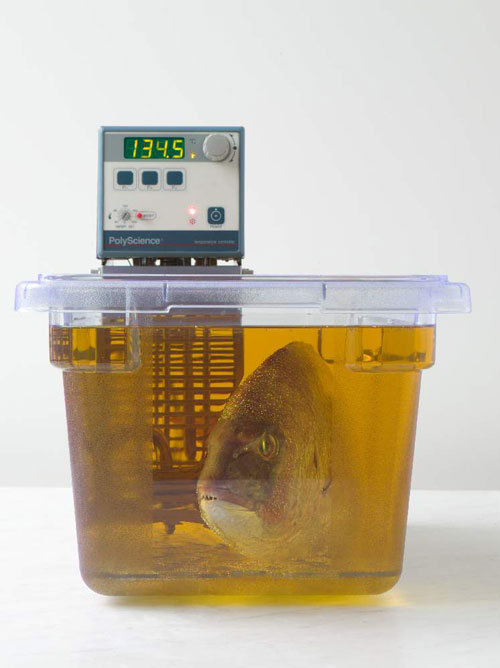
Cooking a large whole fish is challenging. It’s easy to overcook the outside, leave the inside raw, or both. This problem keeps cropping up for me. You see, my stepfather Gerard has three interests: drinking wine, smoking cigars, and  surf casting for striped bass. He’s an accomplished fisherman, and he catches nice big guys –36-40 inches — along the beaches of Cape Cod, whereupon he delivers them to me. When I cook for my family,  I like to cook family style. I want to serve a fish whole, and naturally I want to serve it fried. For years I just bent the suckers into a “U”, dusted them with flour, and chucked them in my deep fryer. They were good, but, truth be told, the outside was overdone and the inside wasn’t really done at all. No one noticed because I served pla pad prik style, with a generous amount of spicy Thai curry. But Nils and I have worked out a better technique with the miracle of low temperature cooking (low-temp and sous-vide primer soon to come).
Many fish, like salmon and mackerel, don’t hold up well when cooked for a long time at low temperatures. Their enzymes keep working while the fish is cooking, breaking down the muscle and making it mushy. The same holds true for crustaceans. Some of these fish also taste terrible when they’re cooked to safe bacteria-killing termperatures:  Salmon served warm, for example, shouldn’t be cooked much above 50 C for taste, but anything below 50 C is actually growing bacteria. Stripers, however, are made for low temp cooking. They don’t deteriorate in the 2.5 hours it takes to cook them low temp. and they do fine cooked all the way up to 57 C –a perfectly safe temperature.Â
So how do you low-temp a striper? They won’t fit in a vacuum machine and you don’t want to poach them. A striper just fits into the wide roll foodsaver bags, and for a while this is how we cooked them. I’ve been told that few things are more amusing than watching Nils and me try to get the foodsaver to vacuum the air out of a 42 inch long food saver bag that’s bent into a U and full of fish and oil.  The “U” is a necessity: otherwise the fish won’t fit in the fryer.
One serendipidous day we had to cook a striper and we couldn’t locate any foodsaver bags — so we just filled our circulator bath with oil. Easy, delicious, though more expensive (cause you need all that oil). It’s our preferred method now, and here it is on a 40 inch striper:
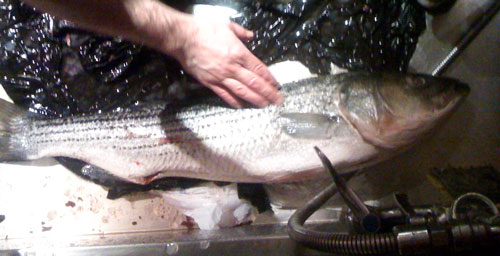
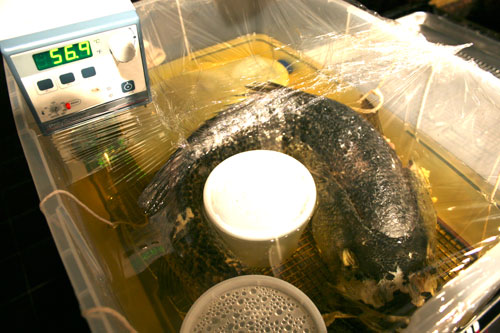
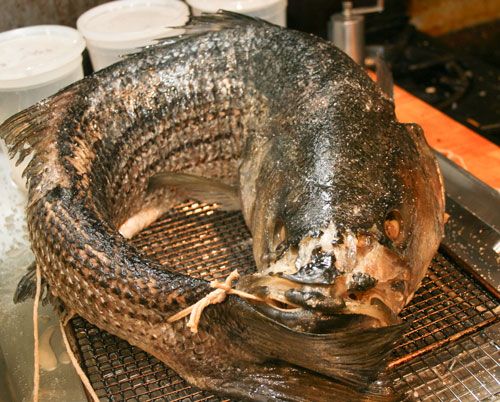
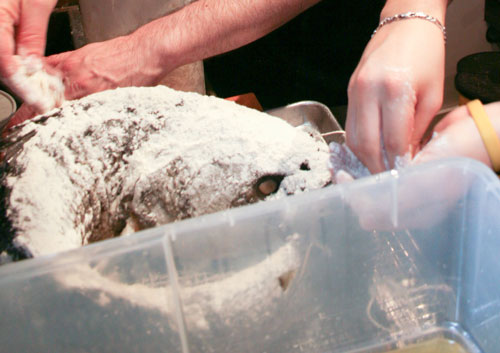
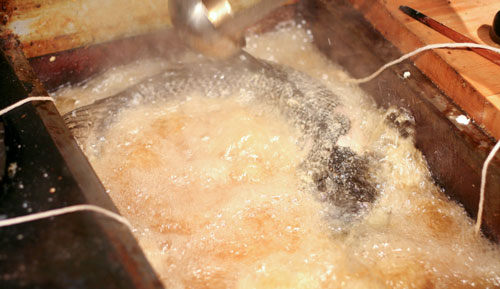
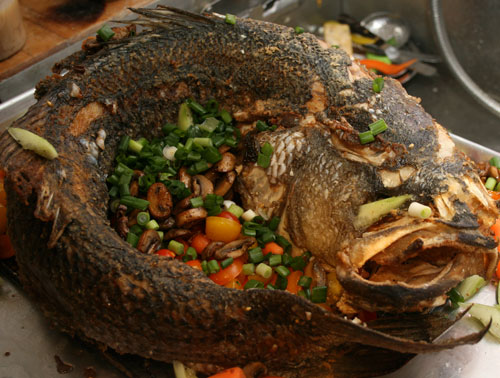

Dave, I am very disappointed with you. I am an unemployed FCI grad and loyal fan of your blog. To my surprise, the other nite, I was with Will Tanner, a good bud of mine from law school and friend of yours from Yale.
He said you were going to grace us with you presence, but u didnt. Will had a bio/chem scientist friend there that made bourbon ice cubes. -78 degrees Cel. per him. They scooped away the teardrop water ice cubes and made some good stuff. Wahhhhh happened?
I am a very bad man. Will is one of my favorite humans.
Holy smokes! In all my years of fishing, I’ve never tried that one. I might have to give it a shot. Thanks for sharing!
I would have to say the skin, although scary to eat since I usually don’t, was damn delicious. The fish was great and all of the guilt from dragging it down the beach as Gerard’s minion all seemed to whither away as I doused it in the spicy thai sauce and left it my memory. A+ Dave
That looks absolutely stunning!
noooo!!!There is only one way to cook fish like that. On charcoal!
Elias,
You mean to finish it? I can’t make a big fire in my apt. I tried once and almost got a divorce.
Hi ! nice blog i have save you on my favourites.
By the way wich oil did you used for the cooking?
Thanks
Howdy Antonchef,
All I had available in the quantity I needed was that super-deodorized commercial fry-oil.
Hello, Mr.Dave. Thank you for the “cocktail” lecture on this past Wednesday. I sincerely hope the rotvap, I mean the distillation method, gets legalized soon in the USA so you will have no problem holding a lecture on it.
I do have a suggetion on this whole fish cooking. I now wonder on cryovac-ing. It seems like you did have a bag big enough to squeeze the guy into, if not, I have created super-sized cryovac bags by using the sealing function of the sous-vide machine. ( you just go minimum gas, and sealing @6-7. I just cut a couple bags in a manner so they are flat, one sheet of plastic, then sealed their edges by the machine.) Now what I wonder is what if we let the fish into the supersized Frankenstein bag, and have the bag cryovaced outside the cryovac machine…. am I suggesting something very silly here??? but you know just the part that needs to be sealed inside the machine… does an object to be cryovaced need to be inside the machine??? Probably…. hmnn I thought it was good idea, but maybe not. What do you think…?
Hi Koji,
Thanks for coming to the lecture. Minipack sells an accesory to use the bags outside the machine. I haven’t used it. I used to use the foodsaver, but that will only work on foodsaver bags. I have some fairly large bags, but they will have a lot of empty space in them if I bend the fish into a U. Tell me if you have any luck.
Deep fry, sous-vide…..I like it. I’ve tied a few large fish before.
How many times can the Lexan/Cambro be used I wonder? The only thing better than catching the Striper is eating ’em!
Thanks,
Bruce Clarke
U of R
is there anylong term damage to the circulator when using oil n butta?
Hi Aaron,
Nope. The circulator couldn’t care less. It is designed to take it. Cleaning it is more difficult.
Is there a specific way to clean after being used in fat?
Circulate on detergent if it isn’t too bad, or else circulate a tab for cleaning combi ovens or circulate a CLR solution.
foodsaver good function ,You do need to control both the water temp and the box temp,I am certainly impressed concerning the impressive solutions you give.